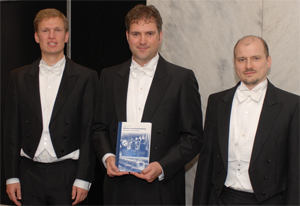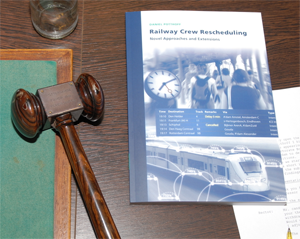Railway Crew Rescheduling
 The crew rescheduling problem arises at passenger railway operators whenever a disruption has rendered the planned crew schedule infeasible. The crew schedules must be fixed very fast in order to limit the effects of the disruption. Currently, crew rescheduling is still done manually by the dispatchers in the control centres. In his research, Daniel Potthoff presents mathematical models and algorithms that lay the foundations for a decision support system for railway crew rescheduling based on Operations Research techniques.
The crew rescheduling problem arises at passenger railway operators whenever a disruption has rendered the planned crew schedule infeasible. The crew schedules must be fixed very fast in order to limit the effects of the disruption. Currently, crew rescheduling is still done manually by the dispatchers in the control centres. In his research, Daniel Potthoff presents mathematical models and algorithms that lay the foundations for a decision support system for railway crew rescheduling based on Operations Research techniques.
In order to evaluate his approach, Daniel Potthoff performed computational experiments with real-life data provided by Netherlands Railways. With the method he employed, called column generation with dynamic duty selection (CGDDS), problems from severe disruptions can be solved within a few minutes. Moreover, this research shows that this method outperforms a simple heuristic that mimics a manual approach. Therefore, Potthoff recommends the Netherlands Railways to introduce such a decision support system for crew rescheduling as soon as possible, as the use of such a system will lead to a better operational performance with fewer delays and cancelled trains.
Daniel Potthoff defended his dissertation on October 21, 2010. His promoters were Prof. Dr. Albert Wagelmans and Prof. Dr. Leo Kroon. Other members of the Doctoral Committee were Prof. Dr.ir. Rommert Dekker, Prof. Dr. L. Suhl, Prof. J. Clausen, and Dr. D. Huisman.
About Daniel Potthoff
Daniel Potthoff (1976) obtained his master's degree in Business Information Systems from the University of Paderborn, Germany in 2005. In the same year he started with his PhD research at Erasmus University Rotterdam. His main research interest is in Operations Research, and in particular in algorithms for railway crew rescheduling. Daniel conducted his research in cooperation with the Logistics department of Netherlands Railways. He presented his research on conferences on three continents. In addition, parts of his research lead to a book chapter and to a paper published in Transportation Science. Moreover, he was awarded the second prize in the 2008 Informs Railroad Applications Section Student Paper Award. The prize was presented at the 2008 Informs Annual Meeting in Washington, DC. After the completion of his thesis, Daniel continued working on railway crew rescheduling at Netherlands Railways. Since September 2010, he has been working as a consultant for Ab Ovo Germany.
Abstract of Railway Crew Rescheduling
 Passenger railway operators meticulously plan how to use the rolling stock and the crew in order to operate the published timetable. However, unexpected events such as infrastructure malfunctions, or weather conditions disturb the operation every day. As a consequence, significant changes, such as cancellation of trains, to the timetable must be made. If these timetable changes make the planned rolling stock and crew schedule infeasible, one speaks of a disruption. It is very important that these schedules are fixed such that no additional cancellations of trains are necessary. Nowadays this rescheduling is still done manually by the dispatchers in the control centres.
Passenger railway operators meticulously plan how to use the rolling stock and the crew in order to operate the published timetable. However, unexpected events such as infrastructure malfunctions, or weather conditions disturb the operation every day. As a consequence, significant changes, such as cancellation of trains, to the timetable must be made. If these timetable changes make the planned rolling stock and crew schedule infeasible, one speaks of a disruption. It is very important that these schedules are fixed such that no additional cancellations of trains are necessary. Nowadays this rescheduling is still done manually by the dispatchers in the control centres.
In this thesis, we use Operations Research techniques to develop solution approaches for crew rescheduling during disruptions. This enables us to solve the basic operational crew rescheduling problem in a short amount of computation time. Moreover, we studied an extension to the basic problem where the departure times of some trains may be delayed by some minutes. We show that this can lead to significantly better solutions for some real-life instances. Furthermore, we presented two new quasi robust optimization approaches that deal with the uncertainty in the length of the disruption. The computational study reveals that one of these approaches outperforms a naive approach in many cases. We believe that the methods developed in this thesis provided the foundation for a decision support system for railway crew rescheduling.


